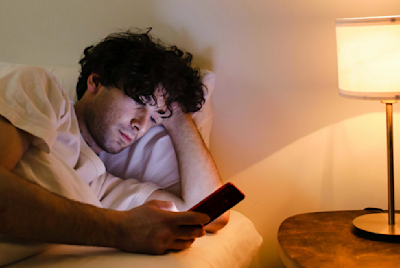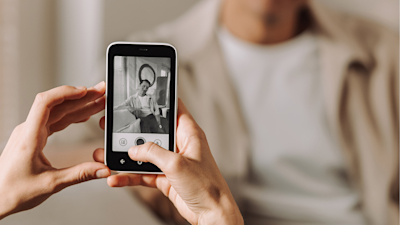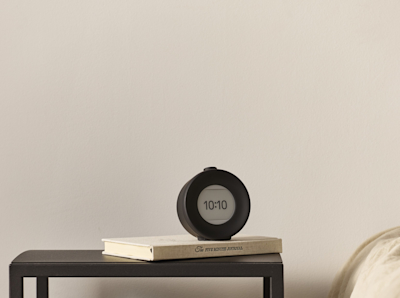
Digital detox makes you more creative, productive and happy
Ernest Barbaric is an executive coach for extraordinary entrepreneurs. He helps people navigate uncertainty, master their mindset and lead with authenticity. He has also been practicing meditation for over a decade. His website is: http://ernestbarbaric.com You can subscribe to his podcast ‘Art of Meaningful Work’ on Overcast, iTunes, Stitcher or RSS. The podcast is for leaders and founders on a mission. We share applied research, actionable insights and personal reflections to help you become a transformational leader.
What would it be like to go for a week without watching any TV, taking in any news, and being completely off social media? A month ago, I gave myself that challenge.
As a result, some of my core behaviours changed to the point where friends, family, and colleagues noticed a significant, positive shift.
During the experiment, I kept a log of thoughts, habits, and energy in a pocket notebook. You can listen to the full experience with daily summaries on episode 44 of Art Of Meaningful Work, or scroll to the end of this post.
Here are the 5 main, actionable takeaways:
1. Eliminate Negative News.
Most of the news we are exposed to is negative. It’s a tactic used by networks in order to exploit our negativity bias – an unfortunate evolutionary trait that kept us safe from danger, and that now keeps us glued to the news.
Going a week without news had a significant impact on my mood and energy levels. This has now become a daily (non)practice.
2. Replace TV and Netflix.
It’s easy to get sucked into a show or a newscast, as they are seamlessly engineered to keep you entertained and glued to the screen. On social media, we have autoplaying and pop-out videos. On Netflix, a series will automatically play the next episode. On TV, news and shows are structured to leave you hanging.
Leaving TV and Netflix off created space for reading, writing, and journaling, which I find incredibly rewarding. In addition, keeping media off in the evenings allowed my wife and me to reconnect on a deeper level every day.
3. Pay yourself first.
As part of this experiment, I scheduled creative time in the mornings. Since I have control over my schedule most days, this meant starting the day with breakfast, a 10-minute meditation, and then a 2-hour time block for creative work.
I found doing creative work as the first task of the day built momentum with writing, research and project work. Just like the financial concept of paying yourself first, depositing an hour or two of creative work into your brand or projects begins to pay dividends and they only increase over time.
4. Be a positive force on social.
Lately, social media has become more links than conversations. So when you actually start a conversation, it’s a novel experience. Like a modern day version of receiving a handwritten letter.
On top of that, recent studies have found a negative correlation between mental well-being and social media usage. So instead, my approach became to ask questions, start actual conversations, and promote the work of interesting people. The idea is to create a positive moment in someone’s day.
5. Schedule checking times.
The urge to keep “checking” things is strong. We’ve built it over years of conditioning through social media, apps, and devices.
And each of these “checks” can result in a 15 – 20 minute distraction, taking away from your creative and productive output.
To make a middle ground, I schedule checking times when all e-mail and social media activity happens. That usually means mid-morning after the creative time block and mid-afternoon after lunch.
This allowed me to create two intense, deep work sessions on most days.
If the idea of unplugging sounds interesting, check out Analog Camp, [a] wilderness retreat for professionals and entrepreneurs. [Launched] in fall of 2017. It’s a strange luxury to go offline in a connected world, especially for people like us.
This experience illuminated the impacts of social media, news-exposure and screen time on creativity, productivity and overall well-being. It brought to light my own ingrained behaviours and habits, which I am now working on improving.
After coming back online, I asked other professionals in my network about their thoughts on doing a digital detox. And I was surprised by so many responses from CEOs, Directors, Entrepreneurs, and other professionals from a variety of industries.
You can have a look at some of these on LinkedIn. To get their take on unplugging, I interviewed 5 or 6 of these folks and will cut together a podcast episode.
I’d recommend giving it a try. If a week seems too long, try turning your phone and laptop off for a Sunday. It might just make you more creative, productive, and happy.
Full Week Digital Detox Log
Day 1 – Muscle Memory
My fingers are automatically opening new tabs – Facebook, Twitter, LinkedIn, and Gmail – within a split second of opening a browser. I tap specific spots on my phone after unlocking it, where those same apps are located.
There is a strong urge to “check” social media for comments and likes. Accidentally opening up Twitter resulted in a small dopamine hit before I quickly closed the tab.
I reach for the phone at any hint of idle time to fill in the void, with a “slap your pocket to check it’s still there” move.
There is also less rushing because TV and Netflix are not coming back on. Normally, we may watch a show in the evening, which created this weird sense of rush to get through our evening routine.
Day 1 was hard. Because I had this urge to check my phone so many times, I removed all social apps from it. It was also odd to catch myself opening a new tab or tapping an app, without thinking. This pattern of behaviour seems ingrained on a muscle memory level.
Day 2 – Engagement & Distractions
Caught myself listening to The Daily, a podcast by New York Times that I love. But it’s news, so it had to go. I unsubscribed right away and deleted it from my podcast app.
I would like to share what I’m working on, or a clever marketing joke, or @-reply someone I want to connect with – but the way I normally do that is through social media. So rather than posting, I decided to collect these thoughts in a draft for a new article.
I noticed myself waiting for, or rather expecting, notifications. Someone engaging with something I posted. This feeling stayed with me while I read a book, and it would chirp at me sporadically like a blinking light out of the corner of your eye.
Today, I reaffirmed how much time gets diverted from real, creative work by indulging in distractions. Whether that means Facebook, or Netflix, or an engaging podcast. These activities fill in time and condition us to give them equal priority as productive work.
Day 3 – It gets easier.
Still experiencing urges to share thoughts and ideas. However, by remembering it’s not an option – I’m starting to feel less… rushed?. There is no need to “check” anything because there is nothing to check. This is turning into a boon for creative and productive work.
Last week, if I got even a little bit stuck in my work I would often alt-tab into Chrome and do a quick scan of social media. Depending on what I see there, it may turn into a 5 or 10-minute session. What I’m noticing are pretty significant time savings, which now allowed me to catch up on all projects.
There is a guilt about not “working”. It feels odd to be fully caught up on work, and even ahead of schedule. There are now periods of idle time between tasks that were previously filled with social, news, or TV depending on the time.
I noticed that by eliminating these distractions, my creative and productive output soared. There is an artificial sense of rush – to check e-mail, look at Instagram, catch up on a Netflix show, or see what’s happening in the world. Removing this created more ease in the day, and resulted in better task-focus.
Day 4 – A Different Start
I usually check my phone upon waking up. Since there is no real reason to do so, I replaced that morning routine with a 5-minute journaling session.
After lunch, I had a meeting with the new CEO of a radio station to talk about PodSummit 2018. When I got up to shake their hand, I knocked over a glass and spilt beer all over my laptop. So… that was a thing that happened.
Strange timing. Today, I received e-mails from Twitter, Yelp and LinkedIn all saying that I haven’t been on there for a while, and offering latest updates from friends and contacts.
How you start your day can define how the rest of it will go. Experiencing a couple of quick dopamine hits from notifications, likes, and e-mail puts me in “busy” mode immediately. Starting slowly, knowing there is a dedicated check e-mail time later on in the morning, made for a much more enjoyable day. Even a quicker emotional recovery from facing a $2000 new laptop bill.
Day 5 – Lighter.
Not having access to news, TV, or social is becoming less of a bother. It’s just a way to be. Mornings feel easier, days feel more productive, and evenings feel less rushed.
Today, I had to run a webinar for an online class. As part of it, we do a live B2B business case study on Twitter. It was difficult to see the notification numbers and not click on them.
For the last couple of evenings, after putting our daughter to sleep, my wife and I would spend quality time together. We played crib with cards we bought on our backpacking trip to Costa Rica almost a decade ago. Both of us lead pretty busy lives, and this was such a nice way to reconnect some more.
Habits form through repetitive behaviour, and they are reinforced by interaction-triggered rewards (like when you get a notification or an e-mail and you experience that little hit of dopamine). There is also inertia to them – the longer you reinforce a habit, the harder it is to break. Having done this for 5 days now, it feels easier, and I feel lighter for lack of a better term.
Day 6 – The Pocket.
Normally, my phone is in my pocket at all times, always within reach. This is partially to serve the need to check things, and partially to be available for calls from clients and family. I started pre-empting these calls by scheduling them earlier in the day and taking the initiative to make the first move.
Since I was able to get ahead of schedule with work and projects this week and made the pre-emptive calls in the morning, we spent the day outside, enjoying the warm weather, and left our phones at home.
The time that would normally be filled with social, or TV is now filled with books, games, and time outside. In the last few days, I managed to get through 3 books.
In an effort to enrich our lives with connectivity, we created an invisible tether. At any point in time, I’m able to research anything, order anything, and connect with anyone by pulling an electronic rectangle out of my pocket. This creates a tension between the world that is happening right in front of you, and the virtual world available at your fingertips.
Day 7 – The End.
We spent so much time outside, that I didn’t even bring my log book with me. Phones stayed at home most of the weekend as well.
We were invited to a colleague’s house for a farewell party, but the address and timing details were on Facebook. So it was up to the ancient phone and email technology to find out the details. And it worked!
In the evening, we sat down to research anti-inflammatory diets, and made a meal plan for the following week. I don’t know if this has anything to do with the detox, but we are now thinking about health a lot more.
Now that the experiment is coming to an end, it didn’t really feel that long. The first few days were tough, but once those behaviour triggers began to weaken, everything just got easier. Now I’m thinking about launching a project with zero social presence, just to see what would happen.
End of log.
Related stories

What is Revenge Bedtime Procrastination and how to overcome it
Revenge Bedtime Procrastination? Many of us end up sacrificing precious sleep to reclaim some “me time” late at night, even though we know it comes at a cost.

The Benefits of Choosing a Mindful Phone Like Mudita Kompakt
Imagine a world where every buzz, beep, and flash doesn't pull you away from the moments that matter.

Master Your Mornings: 7 Things to Do Before Bed
Discover 7 evening habits that transform your mornings & unlock the secrets to peaceful, productive days with Mudita's mindful tech.
If you'd like to receive the best stories from our blog, keep up to date with our progress and get notified about our product releases and special discounts.